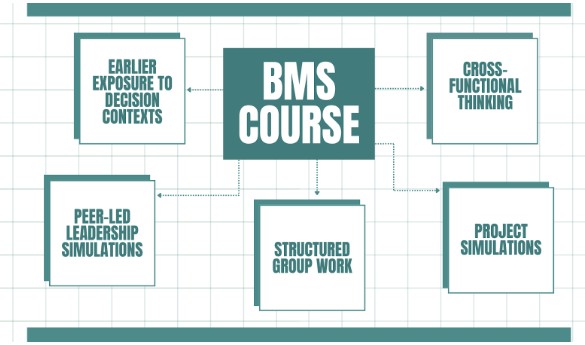Building Business Acumen after 12th: Why BMS is the Smartest Early Bet on a Management Career

Blog / July 24, 2025
BMS DegreeBachelor of Management StudiesBMS InsightsMost students are told that leadership comes later, after a few job switches, an MBA, and enough experience to “finally manage.” But in today’s world, freshers are already making decisions that affect teams, clients, and outcomes. Waiting to think like a manager until one’s late twenties is no longer a safe option.
The Bachelor of Management Studies changes that timeline. It brings management thinking into the undergraduate years, when minds are sharp, curiosity is high, and habits are forming. It trains one to handle real business tools early: market analysis, resource trade-offs, people dynamics, and structured problem-solving.
Unlike traditional undergraduate paths, a bachelor’s degree in management helps one build strategic clarity and decision-making skills before they’re urgently needed. It doesn’t just prepare one to join a team. It prepares one to understand how teams, systems, and decisions connect from day one.
If leadership is the goal, the thinking must start now. That’s the true benefit of a Bachelor of Management Studies: it gives one a head start where it counts the most.

It Doesn’t Begin with an MBA – Why Management Thinking Must Start Before the World Hands You Power
The MBA is a great accelerator. But it’s not the ignition.
Most MBA classrooms are designed to sharpen thinking that’s already been shaped. They polish, but they don’t always build from the ground up.
That’s the job of a Bachelor of Management Studies.
Unlike traditional degrees, BMS isn’t just about lectures and exams. It introduces students to decision-making, people management, and strategic awareness in real, applied contexts.
Here’s what sets BMS apart:
- Earlier Exposure to Decision Contexts: Students don’t just study case studies - they present them. They break down company problems and present decisions.
- Cross-Functional Thinking: A marketing assignment often includes pricing, team dynamics, and even logistics - all in one brief.
- Peer-Led Leadership Simulations: Students rotate roles in group projects, from team leader to client representative.
- Structured Group Work: One handles real-time collaboration, not just solo reports.
- Project Simulations: Courses include hands-on decision-making, from product pricing to talent hiring.
What does this mean for the learner?
This early foundation is one of the biggest benefits of BMS, especially in a crowded job market. So while others are preparing to start thinking about management at 25, BMS graduates are already two steps into the journey. They have already walked through:
- Resource planning
- Team communication
- Risk trade-offs
- Marketing impact mapping
- Basic financial decision-making
The bachelor's degree in management doesn’t delay leadership thinking. It activates it. And in a fast world, early activation is a competitive edge.
Seeing What Others Don’t: How Bachelor of Management Studies Rewires Perception Toward Systems, Structures, and the Subtle Forces That Drive Organizations
One of the least discussed, but most powerful outcomes of BMS is what it does to one's perception.
The course reshapes how students look at business. Instead of tasks, they begin to see systems. Instead of people, they begin to see team dynamics.
This is not philosophy. It’s practice.
Here’s what this shift looks like in the classroom:
- A customer complaint isn’t just a service issue. It’s a feedback loop problem between marketing promises and operations delivery.
- A budget cut isn’t just a financial problem. It’s a structural imbalance between resource availability and strategic priorities.
- A missed team target isn’t just laziness. It’s often a breakdown in communication or a lack of incentive alignment.
Students in BMS are constantly asked to identify:
- What’s visible (the outcome)
- What’s invisible (the system producing the outcome)
They start to recognize that most issues aren’t on the surface.
- A dip in sales? Don’t just adjust targets. Look at what the customer actually heard in the campaign.
- A team misses a deadline? Don’t assume laziness. Map the workflow - the delay may have started two levels earlier.
- A product fails in the market? Don’t change the product. Rethink pricing logic and value positioning.
This kind of thinking forms the heart of modern leadership.
Complexity as Curriculum: Bachelor's Degree in Management is a Safe Arena for Practicing Uncertainty, Trade-Offs, and Consequence-Based Decision-Making
Business isn't neat. Things go off-plan. Markets shift, clients change direction, and budgets get cut.
And that’s exactly why the Bachelor of Management Studies doesn’t just teach business, it teaches how to deal with business when it doesn't follow the plan.
The classroom isn't a stage for perfection. It’s a lab for learning how to think in chaos. Here’s how BMS introduces complexity early:
Decision-making with incomplete data:
Students learn to make calls without perfect numbers, just like in real companies.
Multiple stakeholders:
Projects involve thinking from the perspective of customers, employees, and management.
Team role-switching:
One plays the strategist in one case and a team leader in another, getting to understand the view from every seat.
Case studies and trade-offs:
A good solution for operations might hurt marketing. Students must choose and defend their trade-off.
From the first year, students enter a system built to mirror business challenges:
- Projects have unclear information.
- Case studies include overlapping interests.
- Team roles rotate to build diverse thinking.
- Deadlines feel real because they are tied to evaluation.
This is where the benefits of BMS shine. It gives one a low-risk space to practice high-stakes decision-making.
No other bachelor's degree in management consistently builds this style of thinking this early. Students also develop the habit of presenting their decisions, explaining what worked, what failed, and how they would do it differently next time.
Good management isn’t just about being right. It’s about knowing the cost of being wrong.
The Boardroom Isn’t a Destination - It’s a Style of Thinking That Can’t Wait Until You're 35
Many students think the boardroom is a space for experienced managers.
However, boardroom thinking is a skill that must be learned early, as without it, reaching that level doesn't necessarily mean one knows how to apply it effectively.
The bachelor's degree in management introduces students to the thinking style needed for those roles before they even start their first job.
What does boardroom thinking look like?
- Seeing the whole picture, not just the task
- Thinking about long-term impact, not just short-term results
- Balancing people, numbers, and purpose, all at once
In structured exercises, students assess big decisions:
- Should the company expand to a new state?
- Will this hire change the team culture?
- Is a price cut smart, or short-sighted?
They’re expected to look at:
- Long-term effects
- Team impact
- Customer perception
- Financial trade-offs
And then defend their views. This builds board-level thinking before most students even enter the workforce.
BMS programs also train students to speak in business language. When one applies for a role after graduation, they won't just talk about "good communication" or "being a team player."
They’ll say:
- "I handled a case on capacity planning and recommended against expansion due to seasonal demand gaps."
- "I led a pricing simulation where we analyzed value perception across three target markets."
That is what makes the Bachelor of Management Studies a smarter early bet.
It doesn’t wait for someone to become a senior manager to teach leadership. It teaches leadership before the world even calls one a leader.
Start Thinking Like a Manager From Day One: Bachelor of Management Studies at Shiv Nadar University (Institution of Eminence) is Built for Future Business Leaders
A good management degree builds competence. A great one rewires the way one thinks, asks questions, and makes decisions under pressure.
The Bachelor of Management Studies (BMS) at Shiv Nadar University is designed for those who aren’t just looking to join the business world, but to understand, shape, and lead it. What sets this program apart isn’t just its content, but how and when it delivers what truly matters.
From day one, the learning experience at the School of Management and Entrepreneurship is built around real-world business challenges, not abstract concepts. One is taught to connect dots across strategy, people, data, and systems, preparing the mind to handle ambiguity, trade-offs, and complex decisions early in life.
The program brings together a flexible and modern curriculum, faculty who bridge academia and industry, a strong interdisciplinary foundation, and global exposure & real-world immersion through projects, internships, and exchange opportunities.
If you're seeking a Bachelor of Management Studies program that goes beyond routine instruction and sharpens how you think, act, and lead, then Shiv Nadar University stands out for all the right reasons.
Admissions are open. Apply to the BMS program at Shiv Nadar University today.
Conclusion
Every career has a starting point. The question is: does that starting point prepare one for tasks, or for transformation?
The bachelor's degree in management doesn’t just tick off academic checkboxes. It reshapes how one sees, decides, and acts. It introduces the mind to decision-making, people dynamics, and structural insight long before the market expects it.
That’s what makes the Bachelor of Management Studies a smart early bet, not because of where it places one, but because of how it shapes one.
Build the foundation now. Lead with confidence later. Apply now for the BMS Program at Shiv Nadar University and take the first step toward becoming the manager the future needs.
FAQs
Does one need to do an MBA after BMS to get good opportunities?
No. Many graduates from Bachelor of Management Studies courses move directly into strong roles across HR, marketing, finance, and client operations. An MBA adds value, but BMS stands strong on its own.
Is BMS better than B.Com or BBA for someone interested in leadership?
Yes. B.Com focuses more on accounting and finance theory. BBA leans toward administration. BMS focuses on strategic thinking, business systems, and management frameworks, all core to leadership.
What kind of thinking does BMS develop that other undergraduate courses don’t?
BMS builds decision-making, stakeholder analysis, and systems thinking. Students learn to evaluate business scenarios, manage projects, and weigh trade-offs from multiple angles.